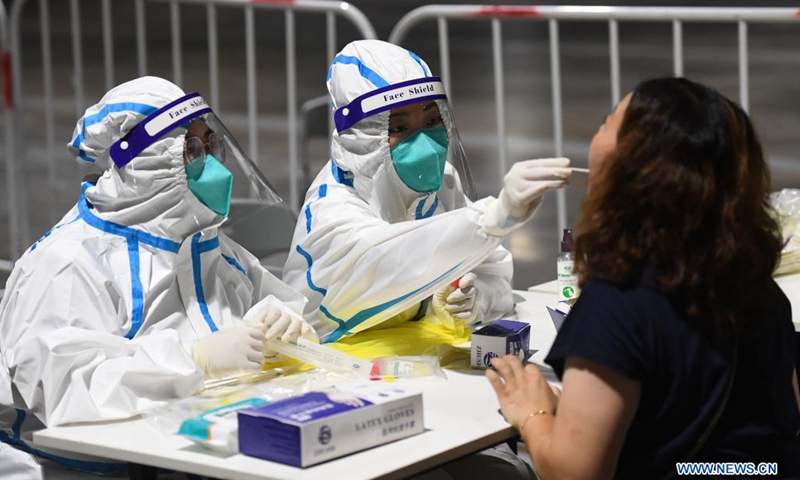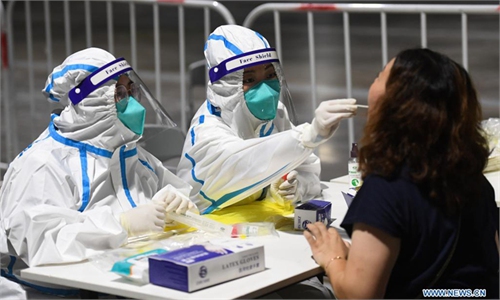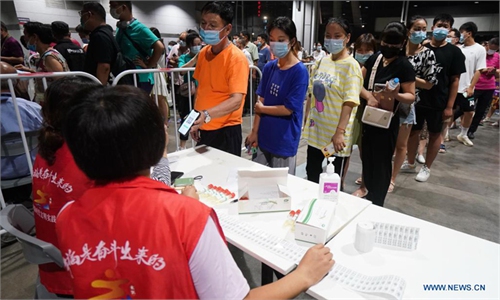Vaccines still effective as vaccinated COVID-19 cases in Nanjing outbreak show mild symptoms: expert

A medical worker takes a swab sample from a woman for COVID-19 test at a testing site in Nanjing, east China's Jiangsu Province, July 21, 2021. Nanjing, which has a population of more than 9.3 million, carried out citywide nucleic acid testing starting on Wednesday.(Photo: Xinhua)
Despite that nearly all COVID-19 cases in the latest outbreak in Nanjing, Jiangsu Province, had received vaccines, experts are assured that the vaccines are effective in protecting people from the virus, especially in avoiding serious illness and hospitalization.
Nanjing has reported 23 infection cases and 14 silent virus carriers as of in the latest outbreak, and The Lukou street in Jiangning district has been considered a high-risk area.
Almost all the cases discovered recently in Nanjing have been vaccinated except one under 18 years old, and all the patients have been mild cases, Yang Yi, an expert on critical medicine from the Zhongda Hospital Southeast University, was quoted as saying on Friday by Beijing Youth Daily.
Experience from previous outbreaks in Guangdong and Yunnan provinces have shown that vaccinated individuals would show comparatively milder symptoms and have a lower chance of deterioration into severe cases, Yang said, noting that vaccinated individuals would also recover faster, Yang noted.
Vaccines are effective in protecting people, but people should still practice protective measures, such as not going to public places too often, wearing a mask and maintaining social distance, Yang said.
According to media reports, about 90 percent of working staff at the airport in Nanjing, or 5,036 people, have received vaccines as of May.
Nanjing authorities have not released information of the variant that caused the outbreak, but Zhuang Shilihe, a Guangzhou-based vaccine expert, told the Global Times it is highly likely to be the Delta variant first reported in India.
It is improper to judge the efficacy of vaccines based on information currently released. But as a whole, it is true that current vaccines, both Chinese and foreign ones, are showing declining efficacy against the dominant variants, according to Zhuang.
The effectiveness of the Pfizer vaccine against COVID-19 has dropped to 39 percent in Israel, significantly lower than 64 percent measured between June 6 and July 3, and 94.3 percent measured between May 2 and June 5, the country's Ministry of Health said on Thursday, the Xinhua News Agency reported.
The new figure refers to the period between June 20 and July 17, the ministry said, adding that the decline was observed along with the spread of the Delta variant in Israel.
However, the effectiveness of the vaccine in preventing severe coronavirus disease in Israel is currently estimated at 91.4 percent, and in preventing COVID-19 hospitalizations at 88 percent, Xinhua reported.
The outbreak in Nanjing started on Tuesday when 17 employees at the Nanjing Lukou International Airport received positive results during a routine nucleic acid test.
Chinese experts said it is very likely that the outbreak was caused by an imported virus, but it was not clear whether the virus was transmitted from human to human or items to human. The key is to figure out whether the virus has been transmitting in the communities.
Nanjing has been conducting city-wide nucleic acid tests for its 9 million residents since Wednesday.
Except Jiangsu Province, cases related to the Nanjing outbreak have also been found in East China's Anhui, Northeast China's Liaoning and South China's Guangdong provinces.
Jin Dongyan, a biomedical professor at the University of Hong Kong, told media it's a good thing that the cases were discovered immediately, calling for enhanced protection measures and equipment for high-risk groups.


